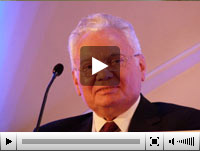- English
Lecture Series
Thirty Ninth Lecture - Thomas Buergenthal
Thirty Ninth Lecture - April 14, 2010
"Never Again: Understanding the Past to Prevent Future Genocide"
Speaker:
Thomas Buergenthal, Judge of the International Court of Justice
At the XXXIX Lecture of the Lecture Series of the Americas, Judge Thomas Buergenthal talked about society’s ability to break free from genocide, concluding that the only way to explain the fact that for the past 65 years we have been proclaiming “never again” - only to have to recognize, at the end of yet another genocide, committed in one part of the world or another, that “never again” has once more become “never again until the next time” - is that mankind is a slow learner.
But despite cases like Cambodia, Rwanda and the terrible crimes that were committed during Balkan wars; and Stalin’s gulags that continued for many years after the Second World War, Judge Buergenthal believes that it would nevertheless be a mistake to believe that no real progress has been made or that no further progress is possible as far as human rights are concerned.
While he lamented that the Holocaust did not bring about an end to genocides, he stressed the fact that we have over the years witnessed significant improvements in the world’s human rights situation, such as the demise of the Soviet Union and its gulags, the end of apartheid in South Africa, and the fact that most of the nations of Central and South America have shed their oppressive military regimes or dictatorships of the left or the right.
As for the international human rights system, Judge Buergenthal reflected on the fact that when Hitler came to power in Germany, with some minor exceptions, the rights of human beings as such were not protected by the international law of the pre-World War II era. The Judge therefore traced the genesis of these laws and institutions back to the Holocaust stating that the large body of UN human rights law which began with the adoption in 1948 of the Genocide Convention and the Universal Declaration of Human Rights, was driven by the then still very vivid memories of the Holocaust.
He then explained that, in a nutshell, today there exist three regional human rights systems: the European Court of Human Rights, the Inter-American Court and Commission of Human Rights and the African Court and Commission on Human and Peoples’ Rights, each operating under its own regional human rights treaty.
Judge Buergenthal noted that it was not until the UN found it necessary to establish ad hoc criminal tribunals to deal with the crimes that were being committed in Rwanda and the former Yugoslavia, that the need for a permanent international criminal court finally gained widespread recognition. While he is pleased that today the International Criminal Court, is recognized by more than 110 countries are now parties to it, he lamented that the United States has yet to become a party to it.
He expressed his enthusiasm for the plethora of national and international human rights NGO networks spawned by UN and regional efforts, spanning the globe and playing an increasingly important role in promoting the protection of human rights by alerting the world to human rights violations, by lobbying for human rights legislation, and by filing national and international human rights complaints.
Judge Buergenthal views the Internet as an ally due to its ability to alert the world, in almost real time, to serious human rights violations taking place in far away countries.
He credited his experience in the Holocaust as the inspiration for his sense of obligation and commitment to work for the protection of human rights, as well as his belief that progress is possible as far as human rights are concerned and that mankind is not doomed to relive its terrible past.
A survivor of the Holocaust, Thomas Buergenthal believes it must continue to be held as a reminder for mankind of the horrendous crimes we human beings are capable of committing and it must force us to think about how to prevent them. “Only thus can we focus the attention of our leaders and of the international community on the task of saving future generations from the fate of yet another genocide, another Holocaust”.
In his opinion, no nation has a monopoly on evil or goodness; all nations or peoples are capable, under certain circumstances, of committing terrible crimes against their fellow human beings. Consequently, the Judge calls on all citizens to remain vigilant because sometimes, unfortunately, all it takes is a charismatic leader with a fanatical following and a population that is not vigilant in guarding its freedom and moral compass.
Despite his painful memories and personal feelings about the Holocaust, Judge Buergenthal has over the years, made his peace with the German people and is an advocate for reconciliation with Germany. He expressed his admiration for what Germany has achieved over the last 65 years, transforming itself from a “murderous Nazi state into a vibrant democracy”. He commended Germany for accepting its responsibility for the crimes that were committed in its name and for being always on guard against repeats.
In reference to his memoir, A Lucky Child, he mentioned that there are episodes in which he struggles with the question of why or how ordinary people become murderers while others retain their humanity under similar circumstances.
He concluded by stressing the importance of early education as the strongest weapon against the ideologies and policies that produce genocides, founded on the belief in the oneness of the human family and the beauty of its diversity.


